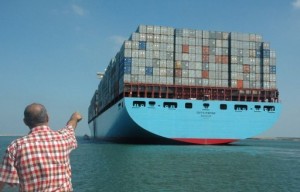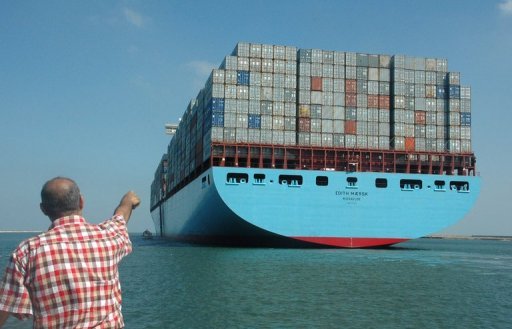
(AFP Photo)
By: Eslam Atrees
Abd El-Khaleq Ayad, president of the board of directors for the Suez Canal Container Terminal Company (SCCT) and management and operations director for the Eastern Port Said Container Terminal, stated that recent events in the city would not affect activity along the port and that work would continue at full pace.
Ayad called on the Egyptian government to reassess its strategy regarding regional development for the Canal Zone, and distribute global tenders to international companies, allowing those whose total capital was made up of less than 75% in Egyptian currency to participate in the process. He added that in every case available, capital lags behind investment, provided that security and stability in the region are accounted for.
He said that until now no concrete steps have been taken on the ground to improve productivity and efficiency within the Canal Zone, saying that, “officials often claim that spurring development in the region will not be difficult; however, these things are easier said than done.” This was made in reference to a number of recent press conferences held by the government to promote new projects in the Canal Zone.
Ayad went on to state that his company would not seek to invest anywhere outside of Egypt.
He went on to say that in 2012 the SCCT loaded and shipped 1.9m containers, bringing in a total of $149m in revenues, 24% less than their targeted amount decided upon at the beginning of the year.
By the end of 2013, the SCCT seeks to ship a total of 2.4m containers, bring in a total of $169m in revenues, and increase Port Said’s share of Egyptian trade in shipping containers to 30% of the national market.
Ayad said however that the SCCT would not increase its share of investment in the region within the coming months, stating that in the last 9 years the company had already spent a total of $650m, having been able so far only to distribute profits to small time shareholders. He added that profits would be distributed to large and mid-sized shareholders for the first time by the end of this year.
He said that the government had engaged in negotiations with the SCCT to discuss plans to expand the size of the Eastern Canal using company, as opposed to government funds. This he said, violated the Appendix 6 law signed by the SCCT and the government midway through last year, which stated that both would work to expand the eastern Canal Zone (whose total cost was estimated to be $100m), with the SCCT contributing $25m. He added that the company had already made its first payment installment of $7.5m, but that so far no work had yet been undertaken to expand the canal.
Ayad added that the company would pay the remainder of its installments, once the government began work to expand the canal. He said that the government was looking to reassess its commitment to the Appendix 6 law, a shocking move considering that the expansion of the canal was expected to have positive results on future development efforts in the Canal Zone.
He added that officials from the global shipping company “CMA-CGM,” had recently alerted members of the SCCT Board of Directors that they would be redirecting their ships to other ports in the region as a result of postponements made to the expansion of the canal.
Ayad stated that plans made in January 2012 to expand the canal were expected to increase the flow of ship traffic from 42 to 65 weekly, which would increase both government and company revenues.
He added that the SCCT was closely following developments in the expansion of the canal, stating that the construction of a new maritime entrance was crucial for its development. He pointed out that the canal’s waterway was its only entrance, and that at the moment it gave priority to convoys as opposed to ships going through the eastern canal.
He went on to say that the construction of a new maritime entrance would help attract new shipping lanes, saying that recently many companies had been reluctant to pass through the canal, and instead have been redirecting their ships to other ports in the Mediterranean Sea. This he said, was the result of huge losses suffered by companies waiting to pass through the Suez waterway due to blockages and overcrowding.
Ayad added that the SCCT was not concerned with plans to construct additional terminals within the vicinity of those operated by the company, saying that such plans would not bear any fruit until the canal itself was expanded. Recent changes in the Ministry’s bureaucracy presented the largest obstacle he said, not only to maritime traffic but also to the expansion of the country’s railway system, saying that all transportation issues in Egypt had to be dealt with as one problem.
He said that the SCCT had so far lived up to all of its obligations as stipulated in their contract with the government, which included paving sidewalks, and importing cranes and other necessary equipment, that met high international efficiency and safety standards.
He added that the SCCT’s terminal on the eastern canal was currently operating at maximum efficiency, at a rate that would could transport and ship 5m containers yearly. He went on to say that the only obstacle the company faced was slowness on the part of the government in working to expand the canal.
Ayad stated that as of now roughly 42 ships passed through the canal weekly, or 6 per day, with the company recently losing an estimated $2m during the four days in which the port was closed. He added that company losses would be much larger if the port were to be closed again.
He added that currently the company only makes money from the loading and offloading of ships, while the government makes far more money, collecting $30,000 per ship that passes through the canal, in what is referred to as “approachment fees”. He added that during the four days that the canal was closed that the government lost $1m.
Ayad further went on to say that there was no reason for employees, who owned small shares of stock in the company, to not show up for work, pointing out however that in many places traffic had been blocked preventing them from doing so. The inability of employees to arrive at work and operate cranes prevented an estimated 30 ships from passing through the canal in recent weeks.




